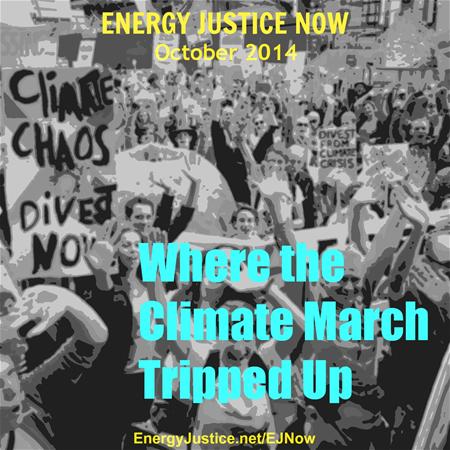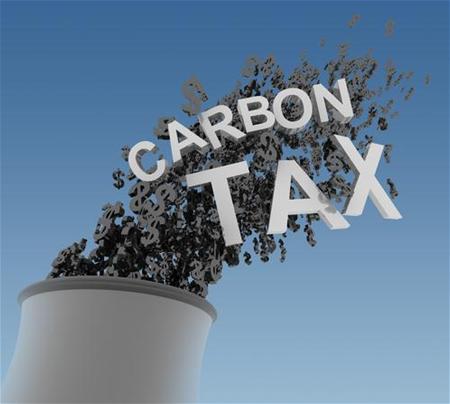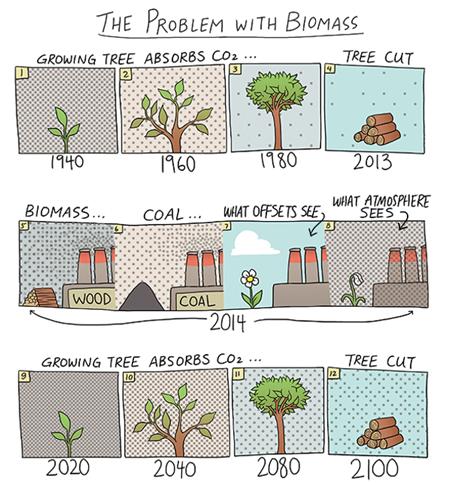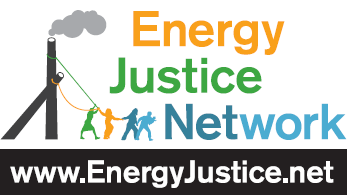| |
A
month ago, we took part in an unprecedented 400,000-person strong
People’s Climate March in New York City. It was huge and inspiring, but
begged many questions.
Was it worth months of lost organizing time and millions of
dollars (and fossil fuels) that people and groups put into it? Some
point out that, at the march itself, there were no speeches, no targets,
and no demands. The disappointing amount of media coverage mainly
focused on celebrities. The march could have done so much more if it
dared to articulate a demand – perhaps pointing out that Obama’s climate
plan would do more harm than good, and explaining why.
Two of the more popular solutions marchers supported are
worthy of a more critical look. There is a growing movement for a carbon
tax, and for fossil fuel divestment. We’re always looking out for the
policy loopholes that cause communities to be targeted with plans for
dirty energy and waste facilities. Out of love for all of the grassroots
community groups we support, we spent the November issue of Energy Justice Now
taking a critical look at carbon taxes, divestment, and other “false
solutions,” and are excited to examine how to improve these campaigns or
refocus on more strategic areas.

Fossil Fuel Divestment: How to Evolve the Campaign
- by Mike Ewall, Energy Justice Network
Sometimes,
environmental movement campaigns that become very popular aren’t the
ones that are the most strategic. Trying to divert the fossil fuel
divestment bandwagon to a better path hasn’t been easy (or
well-received), but some critical examination is long overdue.
As activists like to point out, we don’t have much time to
address climate change. We’re already past the point where we can “stop”
it, and likely past the points where we can contain it to the two
degree Celsius increase that supposedly averts catastrophic levels of
climate disruption. Given this urgency, we cannot afford for so much
time and energy to be spent on campaigns that aren’t fitted to the scale
of the problem. It’s like scaring people about how awful global warming
is, then telling them that they just need to screw in a different light
bulb and drive a Prius.
In short, the fossil fuel divestment campaign is symbolic
and diverts attention from going after the largest and most critical
sectors driving climate change, and from actually disconnecting
institutions from reliance on fossil fuels. It implicitly greenwashes
other dirty energy sources (some of which are worse than coal) by
framing the problem as just about fossil fuels. It similarly ignores the
largest cause of global warming: animal agriculture. Unlike the
anti-Apartheid campaign, it fails to target corporations in a position
to actually change their behavior. Finally, investments are likely to be
shifted to smaller fossil fuel corporations, corporations that support
the fossil fuel economy, or other damaging investments. Efforts to drive
investments to truly clean alternatives will be hampered by economic
contradictions, requiring a deeper economic analysis as the campaign
evolves.
READ MORE / COMMENT
Are Carbon Taxes Another False Solution?
- by Mike Ewall, Energy Justice Network
Carbon taxes are emerging as a major top-down climate
solution enviros would like to see come out of Congress. Plenty of “tax
carbon” signs were present in the 400,000-strong People’s Climate March
in New York City last month.
Even U.N. Secretary-General Ban Ki-moon is urging nations to
adopt either a carbon tax, or the (failed and problematic)
“cap-and-trade” model. Cap-and-trade approaches enrich Wall Street
speculators, can concentrate pollution in vulnerable communities that
lack political clout, and fail to truly reduce carbon emissions, yet
elevate lots of sketchy and climate-damaging false solutions from
burning toxic landfill gases to running Indigenous people off of their
forested lands.

Sadly, carbon tax proposals are riddled with problems as
well, making it a “solution” we can’t support. Real solutions would end
corporate agriculture and dirty energy subsidies (including massive
spending on imperial military adventures) and spell out policies that
regulate and mandate what is actually needed to transform the
agriculture, energy, materials/waste, and transportation sectors into
sustainable climate solutions.
Instead, carbon taxes focus on one sector (energy) and hope
that the market will choose the right solutions in the right time frame
for all sectors. It’s just as likely to elevate false solutions like
nuclear power, biofuels, biomass and waste incineration. Some proposals
explicitly promote some of these false solutions. If not
structured properly, a carbon tax can also be regressive (harming the
poor more).
In June 2013, we put together an Open Letter to Citizens Climate Lobby,
signed by 86 organizations in 29 states and 11 countries, calling out
the problems with the carbon tax legislation they’ve been pushing, which
highlighted the following five points...
READ MORE / COMMENT
Biomass Energy: Another Kind of Climate Denial
- by Josh Schlossberg, The Biomass Monitor
We’re all familiar with climate change deniers, cheerfully
and/or willfully ignorant folk who refuse to accept that human-caused
carbon emissions are responsible for the climate crisis — or that there
even is a climate crisis. Those of us who value science and common sense
typically have as much patience for these twenty-three percent
of Americans as we do for anyone who believes that maggots arise
spontaneously from rotting meat, witches cause disease, or the Earth is
the center of the universe.

Recently,
a subtler breed of climate change denier has emerged, spreading their
propaganda and even infiltrating aspects of the environmental movement:
biomass boosters. These advocates for the biomass energy industry often
avoid detection by professing concern with carbon emissions. Yet, while
cursing fossil fuels out of one side of their mouths, out of the other
they bless the burning of one of the world’s greatest buffers against
runaway climate chaos — our forests — for energy.
If the climate movement wants to win over the American
people and influence policy, it needs to have credibility, which only
comes through consistency, and that means distancing itself from the
climate change deniers in our midst.
READ MORE / COMMENT
Energy Justice Now
provides critical reporting on the entire spectrum of the Dirty Energy
Resistance, highlighting the voices of community organizers
battling fossil fuels, nuclear power, and biomass and waste
incineration
from sea to shining sea. We are accepting submissions at Josh AT energyjustice.net.
In Solidarity,
Mike Ewall, Josh Schlossberg, and Samantha Chirillo
Editors, Energy Justice Now
Donate here (please & thanks!): http://www.energyjustice.net/donate

Logo by Alex Zahradnik Design
|
|
|
TAKE ACTION!
Sign the Energy Justice Platform

Take a stand against dirty energy and false climate solutions by signing your organization onto the Energy Justice Platform.
Isn't about time that the Dirty Energy Resistance unite on a
comprehensive platform to oppose any and all forms of energy production
that harm human health and degrade the natural world? This detailed
platform is the result of years of intensive research and collaborative
co-authorship with dozens of grassroots organizers across the country.
Email Traci AT energyjustice.net to sign on to the platform, specifying if the endorsement is from an organization or an individual.
ACTIVIST TOOLKIT
Biomass Incinerators

One of the most infamous "false solutions" to climate change is biomass incineration.
Despite a typical facility emitting higher levels of air pollution and
CO2 than most coal-fired plants, biomass energy has masqueraded as
"clean and green" for far too long.
Check out all of the operating, proposed and defeated biomass incinerators across the country here.
The Energy Justice Communities Map
keeps track of all the existing, proposed, and defeated dirty energy
and waste facilities in the U.S. in order to build a network of
community groups to fight the facilities and the corporations behind
them.
INFOSHOP
False Climate Solutions

False
solutions to climate change are just as dangerous as doing nothing--and
sometimes even worse! Check out the links below to avoid falling for
the trap of easy fixes that won't do a darned thing to avoid climate
chaos.
Climate Connections: False Solutions to Climate Change
Global Justice Ecology Project's blog with dozens of posts about false solutions.
Indigenous People's Guide: False Solutions to Climate Change
Excellent publication exposing agrofuels (biomass energy), geo-engineering, and GE Trees.
Climate Collective
Great resources debunking supposed climate benefits of nuclear, megadams, and "clean" coal.
Hoodwinked in the Hothouse: False Solutions to Climate Change
A terrific overview of false solutions by Rising Tide North America and Carbon Trade Watch.
The Margarita Declaration on Climate Change
A treatise by 130 social and environmental groups in advance
of November's Social PreCOP on Climate Change in Venezuela, calling out
carbon trading and calling for reduced
energy consumption.
Agriculture and Climate Change: Real Problems, False Solutions
Highly relevant report by EcoNexus, Biofuelwatch, and others
prepared for the UN Framework Convention on Climate Change in
Copenhagen in 2009.
False Solutions
Greenpeace weighs on on the topic, focusing on Carbon Capture, Nukes, and Forest Offsets.
BECCS (Bioenergy with Carbon Capture and Storage): Climate saviour or dangerous hype?
Biofuelwatch tears apart the delusion of burning biomass for
energy and the dubious pipe dream of Carbon Capture and Storage.
GET INVOLVED
Energy Justice Network Email Lists

Energy Justice Network
hosts seven different email lists focused on opposing a particular form
of dirty energy, from Nuclear, to Natural Gas, to Coal, to
Biomass/Waste Incineration, to Ethanol, to Tire Burning, to Power
Lines.
Keep your fingers on the pulse of what's going on in the
movement while strategizing and networking with fellow organizers.
To sign up for any (or all) of the email lists, send an email to Mike AT
energyjustice.net, introducing yourself and your work and specifiying which list you're interested in, and we’ll be in touch!
|
|








